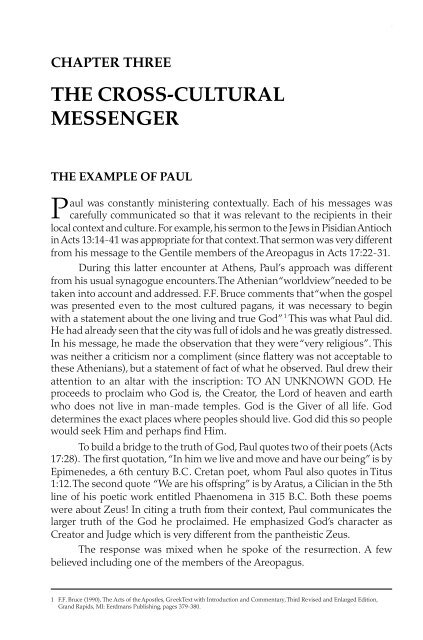WHEN YOU CROSS CULTURES - World Evangelical Alliance
WHEN YOU CROSS CULTURES - World Evangelical Alliance
WHEN YOU CROSS CULTURES - World Evangelical Alliance
Create successful ePaper yourself
Turn your PDF publications into a flip-book with our unique Google optimized e-Paper software.
CHAPTER THREE<br />
THE <strong>CROSS</strong>-CULTURAL<br />
MESSENGER<br />
THE EXAMPLE OF PAUL<br />
Paul was constantly ministering contextually. Each of his messages was<br />
carefully communicated so that it was relevant to the recipients in their<br />
local context and culture. For example, his sermon to the Jews in Pisidian Antioch<br />
in Acts 13:14-41 was appropriate for that context. That sermon was very different<br />
from his message to the Gentile members of the Areopagus in Acts 17:22-31.<br />
During this latter encounter at Athens, Paul’s approach was different<br />
from his usual synagogue encounters. The Athenian “worldview” needed to be<br />
taken into account and addressed. F.F. Bruce comments that “when the gospel<br />
was presented even to the most cultured pagans, it was necessary to begin<br />
with a statement about the one living and true God” 1 This was what Paul did.<br />
He had already seen that the city was full of idols and he was greatly distressed.<br />
In his message, he made the observation that they were “very religious”. This<br />
was neither a criticism nor a compliment (since flattery was not acceptable to<br />
these Athenians), but a statement of fact of what he observed. Paul drew their<br />
attention to an altar with the inscription: TO AN UNKNOWN GOD. He<br />
proceeds to proclaim who God is, the Creator, the Lord of heaven and earth<br />
who does not live in man-made temples. God is the Giver of all life. God<br />
determines the exact places where peoples should live. God did this so people<br />
would seek Him and perhaps find Him.<br />
To build a bridge to the truth of God, Paul quotes two of their poets (Acts<br />
17:28). The first quotation, “In him we live and move and have our being” is by<br />
Epimenedes, a 6th century B.C. Cretan poet, whom Paul also quotes in Titus<br />
1:12. The second quote “We are his offspring” is by Aratus, a Cilician in the 5th<br />
line of his poetic work entitled Phaenomena in 315 B.C. Both these poems<br />
were about Zeus! In citing a truth from their context, Paul communicates the<br />
larger truth of the God he proclaimed. He emphasized God’s character as<br />
Creator and Judge which is very different from the pantheistic Zeus.<br />
The response was mixed when he spoke of the resurrection. A few<br />
believed including one of the members of the Areopagus.<br />
1 F.F. Bruce (1990), The Acts of the Apostles, Greek Text with Introduction and Commentary, Third Revised and Enlarged Edition,<br />
Grand Rapids, MI: Eerdmans Publishing, pages 379-380.<br />
17

















